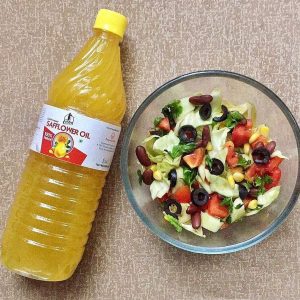Organic Gir Cow Ghee (A2)
Description
Description
Our traditional Desi Cow Cultured Ghee recipe has been used for thousands of years. The ancient tradition of Ayurveda considers Cultured Ghee important for strengthening Agni, our powerful digestive fire. Cultured Ghee is known as Desi Ghee in India, where the word desi means prepared with indigenous method.
Cultured Ghee is the best choice if you are dairy intolerant because during the culturing/fermentation process of cream, lactose is converted into lactic acid. This makes for a much more digestible product for many people.
Ghee making process :

Why this Ghee is different ?
- Prepared through the traditional Fermentation process especially from Ayurvedic perspectives
- Food Grade Stainless Steel vessels are used for storage and preparation.
- Prepared from In House Certified Pure Organic Cow Milk
- No Chemicals, no pesticides no hormonal injections used on cows and fodder
- No Preservatives added
- It has natural Color. No colors added
- 9 months shelf life
- Best taste and value for money attributes
- Rich in vitamins, Minerals and Metals
- FSSAI approved Organic Cow Ghee
The Cows are grass fed/ with organic fodder, produced using in house vermicompost, cow dung manure and cow urine etc.



Related products
Sesame oil (white)
₹ 450.00 – ₹ 2,200.00What are cold pressed oils?
The oils that you use for cooking everything are extracted from seeds, fruits or vegetables and even nuts. Cold pressing is the method of oil extraction from oilseeds which may include sesame seed, sunflower seeds, canola, coconut or olive without really using heat to extract as that may degrade the oil’s flavour and nutritional quality. Cold pressing method is the process involving crushing seeds or nuts and forcing out the oil through pressure.
In olden times, a long cylindrical contraption known as ‘ghani’ was used to extract oil from oilseeds. Ghani was a mortar and pestle device made of stone or wood that used a perambulating animal to extract oil under pressure from oil-bearing seeds. This was the simplest method for cold pressing oils out of a seed as it didn’t involve the generation of too much heat.
What is available at most stores & supermarkets ?
If you are careful enough you will see different kinds of labels on your oil packaging :
“Losorb”
“Lite”
“Blanched”
“Refined”
What these words really mean is “our oil has gone through tons of chemical processes and is stripped of all it’s natural nutrients!”
What is Oil Refining?
Refining is a process of purification of oils. In this process, oils are robbed of naturally occurring gums, proteins, phospholipids, fine seed particles etc. This makes the oil “light/losorb”. Oils are also neutralized (acidity balanced!), bleached (stripped of color) and deodorized (devoid of it’s natural aroma). And to achieve all these the oil is heated at high temperatures and is treated with chemicals etc.
In a nutshell, modern refined cooking oils provide nothing but pure empty calories (devoid of all nutrients but fats!)
Here’s what Oil Refining looks like :
Why do oil companies sell Refined Oils ?
•Yield
•Shelf Life
•Price
•Modern cooking style of “deep frying”
Why you should move to cold pressed oils :
• Nutritionally Rich: Be it traditional lakdi ghana/kachchi ghani/chekku ennai or commercially prepared extra virgin oils (made using temperature controlled expeller pressing method), cold pressed oils retain most of proteins, vitamins, phosholipids, antioxidants, lecithin etc. And obtaining these essential nutrients from an all natural source is a much wiser and holistic choice than getting them from multivitamin pills.
• Chemical Free: During refining, various chemicals are used like Hexane, Sodium Hydroxide, Sodium Bicarbonate (baking soda), Bleaching Agents etc. And on top of that chemicals like Propyl Gallate, BHA, BHT are introduced as preservatives! Now not all of these are exactly toxic or carcinogenic , but if you are someone who is conscious about living organically and staying away from chemicals, you should consider switching back to cold pressed!
• Forgotten Flavors: Virgin oils, their flavor and aroma, compliments all Indian foods and the spices well. Get those forgotten flavors back into your food.
• Environmental Impact: You lower your carbon foot-print when you are consuming less processed things and saving the environment too.
• Way of Life: Cooking with cold pressed oils has been a tradition not only in India.
Few things to remember :
• Storage:
Cold pressed oils have a limited shelf life (max 6 months). You can always maximize the shelf life by storing it in the cold (think refrigeration) and dark (think non transparent bottles) places, although it is always advisable to use them up as soon as possible to reap their full nutritional benefits.
• Using it up :
Every time you open a bottle of any cold pressed cooking oil – use within 45days.
Moringa oil
₹ 300.00Moringa oil uses and benefits :
Moringa oil has been used as a medicinal folk cure and as a topical, cosmetic ingredient since ancient times. Today, moringa oil is manufactured for a wide range of personal and industrial uses.- Cooking oil : Moringa oil is high in protein and oleic acid, a monounsaturated, healthy fat. When used for cooking, it’s an economical, nutritious alternative to more expensive oils. It’s becoming a widespread nutritional staple in food-insecure areas where moringa trees are grown.
- Topical cleanser and moisturizer : Moringa oil’s oleic acid makes it beneficial when used topically as a cleansing agent, and as a moisturizer for skin and hair.
- Cholesterol management : Moringa oil contains sterols, which have been shown to lower LDL or “bad” cholesterol.
- Antioxidant : Beta-sitosterol, a phytosterol found in moringa oil, may have antioxidant and antidiabetic benefits, although more research is needed to confirm this.
- Anti-inflammatory : Moringa oil contains several bioactive compounds which have antioxidant and anti-inflammatory properties, both when ingested and used topically. This may make moringa oil beneficial for acne breakouts. These compounds include tocopherols, catechins, quercetin, ferulic acid, and zeatin.
Moringa oil for hair and skin :
For hair
Ingredients
- 2 cups of a carrier oil, such as almond oil, that has moisturizing properties
- 10 drops of moringa oil
- 5 drops of a beneficial essential oil, such as lavender or tea tree oil
Directions
- Mix the oils together in a glass bowl or bottle.
- Apply to the hair, massaging into the roots.
- Cover hair, and leave on overnight.
- Shampoo and condition hair as usual.
For skin
Directions
- Use the same ingredients as the hair treatment. Try experimenting with different carrier oils and essential oils to vary the scent.
- Massage gently into your skin on the face or the body.
- Tissue off any excess.
Almond oil (sweet)
₹ 300.00- Regulates Cholesterol
- Reduces Risk of Heart Disease
- Protects Against Diabetes
- Promotes Healthy Weight
- Keeps Your Colon and Rectum Healthy
- Treats Ear aches
- Great for Your Skin and Hair
How to use almond oil :
- For your hair it is advised to apply as much as needed in the roots. Almond oil has a light texture and absorbs quickly in to the scalp. Use it for the treatment of psoriasis, dry scalp and dandruff. It will also enriches the quality of hair by thickening it and adding lustre.
- Almond oil is a natural remedy for eczema , it relieves eczema symptoms of itchiness and redness. For treatment; apply drops of oil on skin in affected area and massage gently. It will reduce signs of again by rejuvenating the skin and removing dead cells.
- Apply a few warm drops beneath your bottom eyelid before bed, it will brighten up dark circles and reduce puffiness of eyes.
- For ingestion one can drizzle the oil on salads as a dressing, as it regulates cholesterol levels. It’s advisable to have 1-2 teaspoons of almond oil in morning, the oil is proven to be a natural laxative and relieves constipation.
- Calories: 120
- Total fat: 14 g
- Saturated fat: 1.1 g
- Monounsaturated fat: 9.4 g
- Polyunsaturated fat: 2.3 g
- Vitamin E: 26% of the RDI
- Phytosterols: 35.9 mg
Safflower Oil
What are cold pressed oils?
The oils that you use for cooking everything are extracted from seeds, fruits or vegetables and even nuts. Cold pressing is the method of oil extraction from oilseeds which may include sesame seed, sunflower seeds, canola, coconut or olive without really using heat to extract as that may degrade the oil’s flavour and nutritional quality. Cold pressing method is the process involving crushing seeds or nuts and forcing out the oil through pressure.
In olden times, a long cylindrical contraption known as ‘ghani’ was used to extract oil from oilseeds. Ghani was a mortar and pestle device made of stone or wood that used a perambulating animal to extract oil under pressure from oil-bearing seeds. This was the simplest method for cold pressing oils out of a seed as it didn’t involve the generation of too much heat.
What is available at most stores & supermarkets ?
If you are careful enough you will see different kinds of labels on your oil packaging :
“Losorb”
“Lite”
“Blanched”
“Refined”
What these words really mean is “our oil has gone through tons of chemical processes and is stripped of all it’s natural nutrients!”
What is Oil Refining?
Refining is a process of purification of oils. In this process, oils are robbed of naturally occurring gums, proteins, phospholipids, fine seed particles etc. This makes the oil “light/losorb”. Oils are also neutralized (acidity balanced!), bleached (stripped of color) and deodorized (devoid of it’s natural aroma). And to achieve all these the oil is heated at high temperatures and is treated with chemicals etc.
In a nutshell, modern refined cooking oils provide nothing but pure empty calories (devoid of all nutrients but fats!)
Here’s what Oil Refining looks like :
Why do oil companies sell Refined Oils ?
•Yield
•Shelf Life
•Price
•Modern cooking style of “deep frying”
Why you should move to cold pressed oils :
• Nutritionally Rich: Be it traditional lakdi ghana/kachchi ghani/chekku ennai or commercially prepared extra virgin oils (made using temperature controlled expeller pressing method), cold pressed oils retain most of proteins, vitamins, phosholipids, antioxidants, lecithin etc. And obtaining these essential nutrients from an all natural source is a much wiser and holistic choice than getting them from multivitamin pills.
• Chemical Free: During refining, various chemicals are used like Hexane, Sodium Hydroxide, Sodium Bicarbonate (baking soda), Bleaching Agents etc. And on top of that chemicals like Propyl Gallate, BHA, BHT are introduced as preservatives! Now not all of these are exactly toxic or carcinogenic , but if you are someone who is conscious about living organically and staying away from chemicals, you should consider switching back to cold pressed!
• Forgotten Flavors: Virgin oils, their flavor and aroma, compliments all Indian foods and the spices well. Get those forgotten flavors back into your food.
• Environmental Impact: You lower your carbon foot-print when you are consuming less processed things and saving the environment too.
• Way of Life: Cooking with cold pressed oils has been a tradition not only in India.
Few things to remember :
• Storage:
Cold pressed oils have a limited shelf life (max 6 months). You can always maximize the shelf life by storing it in the cold (think refrigeration) and dark (think non transparent bottles) places, although it is always advisable to use them up as soon as possible to reap their full nutritional benefits.
• Using it up :
Every time you open a bottle of any cold pressed cooking oil – use within 45days.





